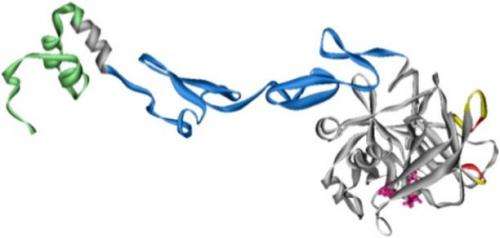Experimental drug could help reduce brain damage, improve motor skills after stroke

(Medical Xpress)—A University of Arizona professor is overseeing the manufacture of an experimental drug that could help reduce brain damage after a stroke.
The drug, known as 3K3A-APC, currently is undergoing clinical trials in Europe to determine its safety in humans after proving effective in animal models at reducing brain damage and improving motor skills after a stroke when given in combination with another commonly used stroke therapy.
Thomas Davis, professor of pharmacology in the UA College of Medicine, was chosen to direct the manufacture of the drug for human trials after co-authoring a recent paper in the journal Stroke that pointed to the drug's effectiveness in rats and mice when used in conjunction with a clot-busting therapy known as tissue plasminogen activator, or tPA.
While tPA is commonly given to sufferers of ischemic stroke, which results from an obstruction in a blood vessel supplying blood to the brain, the therapy poses significant challenges when administered alone, including a limited treatment window, Davis said.
"It has to be given within the first three to four and a half hours of the stroke," Davis said. "It only works in 10 percent of the patients, and it causes bleeding, so tPA alone isn't that effective."
Researchers now have found that 3K3A-APC, with its cell protective properties, may be effective in extending the treatment window for tPA while protecting against programmed cell death in the brain, which occurs when cellular signals convince brain cells to kill themselves following a stroke. When tested in rodents, the combination therapy reduced brain damage by more than half, eliminated tPA-induced bleeding and significantly improved motor abilities.
The drug 3K3A-APC initially was created by a team of scientists at the Scripps Research Institute and the University of Southern California, led by John Griffin, professor at the Scripps Research Institute, and Dr. Berislav V. Zlokovic, director of the Neurogenic Institute at USC's Keck School of Medicine. It was further developed by Houston-based biotech company ZZ Biotech, for which Davis serves as a consultant and member of the scientific board of directors.
Davis worked closely with Griffin, Zlokovic and other collaborators to develop proper manufacturing procedures for the drug, which is being produced under Davis' direction by ZZ Biotech's contracted manufacturer, Laureate Biopharmaceuticals, in New Jersey.
The drug 3K3A-APC is a genetically engineered variant of the naturally occurring activated protein C, or APC, which helps regulate blood clots and inflammation in the body.
Previous research on naturally occurring APC, conducted by Griffin and Zlokovic, pointed to the protein's ability to prevent programmed cell death in the brain. However, APC's natural blood-thinning properties posed a problem when considered as a treatment for stroke, since it might induce bleeding in the brain.
To address that problem, Griffin's hematology lab worked to develop an engineered variant of APC with fewer anticoagulant properties, and thus 3K3A-APC was born.
Davis was chosen to lead the production of the drug because of his extensive drug manufacturing experience and connection to ZZ Biotech.
Prior to joining the UA College of Medicine in 1980, Davis worked as a chemist for Abbot Pharmaceutical Co. Considered a premier investigator in the field of blood brain barrier research, Davis is widely regarded for changing the way drugs are designed and manufactured by pharmaceutical companies for brain delivery.
So far, no side effects have been shown in the initial clinical trials of 3K3A-APC in normal human subjects, Davis said, adding that he is prepared to manufacture more of the drug for future trials. "Starting next January, it will go into phase two clinical trials in stroke patients as an adjuvant therapy, together with tPA."















